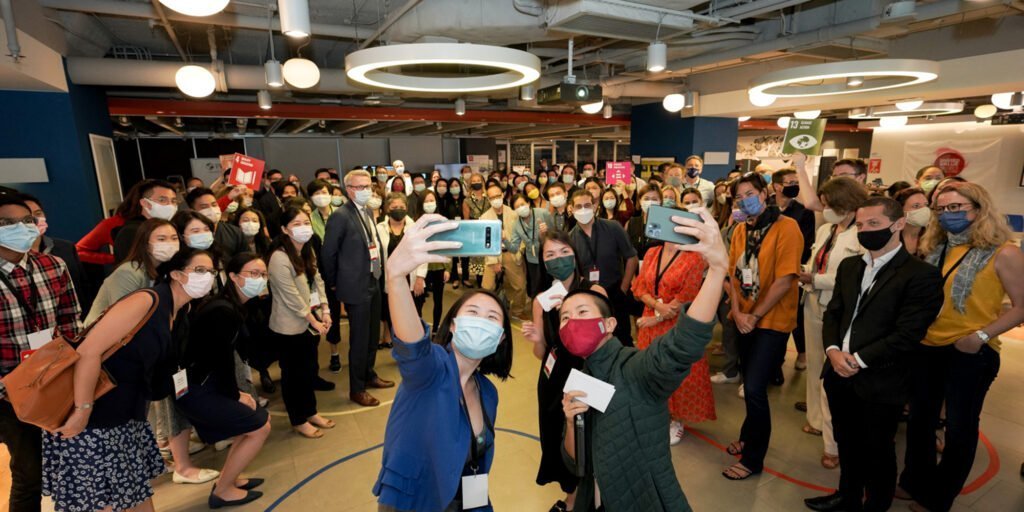1. Impact Stigma
Some impact ventures, social enterprises and purposeful business intrapreneurs know they are impact-driven but avoid the label for fear of being seen as less profitable.
This is shown by the lower response rate to the recent HK social enterprise landscape survey, also confirmed by SE founders and VC comments. We need to examine the perception problems in HK, as reinforced by oversimplified media narratives about ‘giving back’ or ‘sacrifice’, a lack of public understanding, and limited data to argue against the impact trade-off of return.
I asked this in a recent meeting with our Members, rhetorically: At what point can a local venture lead with impact in an investor meeting? And be rewarded for it? This issue is multifaceted and needs to be tackled at various levels, but the gist is the same.
One cause for optimism: A few people from the Impact Circles community (formerly Social Entrepreneurs Meetup HK) have started a task force on improving the local public understanding and media narrative around social entrepreneurship and innovation. Let us know if you’d like to get involved.
2. Siloed Thinking
People are starting to step outside their boxes and circles are blurring, but you can still see boxed-in thinking in how business people imagine collaborations with the social sector, or vice versa. We need to develop more fluid and lateral thinkers, tightrope walkers, hallway translators. Otherwise we will get more of the same ideas and results.
At SVIHK we’re still learning how to challenge ourselves and our community with new forms of interaction, but the range of CREATIVE COLLISION session formats is one example. I was disappointed in a recent industry event that even a batch of ’emerging leaders’ can only think of traditional collaboration models at first round.
I believe the untapped capacity is there, we just need to carve out the mindspace and release the creative confidence to actively break the frame. How can we try to do this collaboration differently? Sometimes it just needs a blessing from leadership, not always extra funding. For example, we have successfully tested partnership models generating rich ‘social capital’ with ripple effects, without any funds, purely network resources.
3. Unequal Power
Fewer stages and speeches, more roundtables and focus groups.
We need to see NGOs as issue experts and be grateful for their frontline insight, rather than them being grateful for your funds, as I mentioned at an Asian Charity Services talk. We avoid ‘beneficiaries’ in favour of ‘users’ and ‘co-creators’. It takes a conscious effort to level the power dynamic in every tri-sector roundtable and event. The same applies to having youth voices alongside senior executives, ethnic minorities next to Chinese locals.
It’s time to check our systemic bias. Have a current student critique your youth development business idea. Confront the ageism in advisory committees and boards. Who is bold enough to try a youth board, or have a non-corporate community user on your board?
4. Grant Dependency
This is related to above. When fundraising pools dried up during the pandemic, the local NGO Task Force stepped up to rally citizen support via handout donations. But the reality is that for non-profits with little reserves or strict fund use restrictions, we watched how the meat fell off the bones to reveal starving non-profits still diligently prioritising their served communities.
We need new forms of financing for new forms of collaboration mentioned above.
Hong Kong’s first Pay-for-Success pilot (aka social impact bond) is launching soon – tasked to improve minority kids’ Chinese proficiency – after years of effort, fundraising and deal structuring. We were recently introduced to the Gravity Capital Partners and have been working with Sustainable Finance Initiative.
While impact investing is a separate but parallel track to CSV, as is venture philanthropy, it’s increasingly clear that to launch new experimental models, we need new financing models. If you know someone, please get in touch.

5. Duplication & Fragmentation
With all due respect to those who see a gap and take it upon themselves to act… Consider spending more time connecting the dots. I see a general type of founder infatuation, not only in impact start-ups, but also in the overlap of sustainability and impact events. In fact, this also applies to ESG frameworks and impact measurement, hence the efforts now to converge.
Why start a new event when others have already built one for x years? Have you done the landscape mapping and stakeholder interviews? If you put aside the appeal of your name on the label, could the effort you wholeheartedly plan to put into building a following and infrastructure possibly be better spent negotiating with similar ventures to influence a greater outcome and higher form of iteration? I daresay it’s at least worth a conversation to improve your proposition and see who’s open to collaboration.
I’m all for healthy competition, but there is simply too much ramping up 0 to 5 when we could be taking 9 to 90 or 3 x 3 x 3. One of our successful attempts to reduce fragmentation in the workplace mental health ecosystem is our monthly Mental Well-being Mixer, co-hosted with Shaping Minds. If you’re interested in joining this peer community, drop us a line.
6. Pie in the Sky
Stop talking, start doing. I hope we are not hypocritical here; I hope you can see that SVIHK tries to push actions and empower champions, rather than hold endless discussions and publicise empty releases.
But this is more than a complaint about talk shops. This is an impatient expectation – and our constant push – that influential business leaders who believe in purpose, especially those in our community, truly deliver on that vision for change by:
- Enabling intrapreneurs to challenge status quo
- Demanding robust CSV plans & metrics
- Incentivising behaviour change
- Investing in experiments
Wicked problems and culture change are hard to tackle, so we have been starting from research-based ‘best practices’, encouraging baby steps, nudging small wins, forming mini bridges between business lines. This change in approach started with our Ageing Society Task Force. We believe these small steps will add up to a foundation for long-term change.
7. Conservative Policy
Hong Kong is fighting to maintain its competitiveness against the usual suspects in the region and now the Greater Bay Area. If tax laws, trade policies, green subsidies and recovery funds are an attempt to retain and attract private capital and talent in HK, clearly the private sector is the engine to growth, innovation and sustainable development.
We always hear that the private sector and civil society need to lobby the government. While some groups pursue this, our attention has been on reminding the average working professional that you actually have more power to enact social change than you may realise.
Since policy is not our area, our workaround to this is:
1) rallying the private sector to set a higher standard for ourselves, with ambitious targets on each issue;
2) empowering intrapreneurs and connecting the dots between players to release greater synergies.
The other underutilised approach is how we leverage business chambers, associations and platforms to back the research-based policy recommendations of think tanks and do-tanks like Civic Exchange, Our Hong Kong Foundation and MWYO – all those doing the good work to map pathways to decarbonisation and transition steps on social issues.
8. Antagonising Agitators
It’s sensitive, but we cannot shy away from political unrest and youth activism in talking about social innovation. We covered this in Candid Café at CREATIVE COLLISION 2020, bravely led by Kelvin Lee of Enactus HK and Benita Chick of Encompass HK (thank you).
The last two years of upheaval have shown that Hong Kong has an astounding spirit of civic engagement, that personally I never saw before. Sure, there is a polarising spectrum of political expression, some more activist and extreme, but on the whole, you see that people care, they are willing to take a stance, and the youth especially refuse to accept status quo.
We saw one of the highest voter turnouts in Hong Kong history. Don’t overlook all the youth getting involved at neighbourhood level, district level, in policy dialogue. And there is so much can-do energy among young social entrepreneurs. Legalities and political views aside, HK’s spirit of social change is alive and well. How the rest of us respond is the question.
For the SVIHK Youth Development Initiative, we brought in local youth voices, a youth think tank, social entrepreneurs and experts to better understand how to meet their aspirations and needs. It’s not so much about ‘developing’ youth as enabling their own exploration, expression and constructive opportunities. While this is in progress, I’m happy to share that quiet levers are moving in some big machines.

Theodore Roosevelt quote
Turning Nothing into Something
Wind erodes rock; water can cut mountains. So many people are understandably discouraged and pessimistic this year.
Try this: Every time you see a headline that some global issue is going in the wrong direction – be it poverty or climate, or conflict or racism – remember that you have the power to do something from exactly where you stand, that you don’t have to quit your job, that there are solutions and like-minded people even here.
Our advice: Find your tribe, spend more time on the gaps and keep evolving.
So tell me, what’s your vision for this sandy blank slate, going into 2021? Comment here or message me. Maybe we can connect you up.
About Martina Mok

As Head of Programmes & Partnerships, Martina manages member services and builds tri-sector partnerships to promote the adoption of Shared Value. She is passionate about catalysing sustainable change through a business-led, cross-sector approach.

